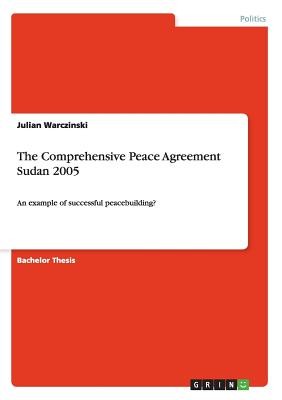
- We will send in 10–14 business days.
- Author: Julian Warczinski
- Publisher: GRIN Verlag
- ISBN-10: 3638947696
- ISBN-13: 9783638947695
- Format: 14.8 x 21 x 0.2 cm, softcover
- Language: English
- SAVE -10% with code: EXTRA
Reviews
Description
Bachelor Thesis from the year 2007 in the subject Politics - International Politics - Region: Africa, grade: 1,7, Free University of Berlin (Otto-Suhr-Institut für Politikwissenschaft), language: English, abstract: The signing of the Comprehensive Peace Agreement (CPA) in Nairobi on January 9, 2005 was described as "a historic moment of great opportunity for the country" by then-United Nations Security Council President Joel Adechi of Benin. The CPA received wide international approval and was praised as a promising chance to end one of Africa's longest and fierce civil wars. Since the end of British colonialism in 1955, more than two million people have been killed and about the same number is said to be a realistic estimate of internally displaced persons (IDPs) during the course of Sudan's wars. The main objective of this paper is to analyze and evaluate the current status of the peace-process and the implementation of the CPA as a tool for peacebuilding in Sudan at a time where its success seems to be at serious jeopardy. The central research question this paper constitutes has three main parts. First, the question is whether the CPA has the formal quality and extensiveness in its paperwork to effectively conduct a peace process. The second part of the question is whether the implementation process is effective, punctual and progressive with visible results that indicate a realistic chance for sustainable peace in the Sudan. The last part discusses chances and possible reasons of a future return to armed conflict between the parties. Due to the papers limits in length, priority will not be put on thoroughly identifying and explaining the importance of all other armed groups (OAGs) involved in the conflict, without failing to recognize their existence and importance. The main focus will be put on the parties which signed the CPA as the official representatives of North and South, the National Congress Party (NCP) and the Sudanese Peoples Liberation Movement/A
EXTRA 10 % discount with code: EXTRA
The promotion ends in 17d.14:13:27
The discount code is valid when purchasing from 10 €. Discounts do not stack.
- Author: Julian Warczinski
- Publisher: GRIN Verlag
- ISBN-10: 3638947696
- ISBN-13: 9783638947695
- Format: 14.8 x 21 x 0.2 cm, softcover
- Language: English English
Bachelor Thesis from the year 2007 in the subject Politics - International Politics - Region: Africa, grade: 1,7, Free University of Berlin (Otto-Suhr-Institut für Politikwissenschaft), language: English, abstract: The signing of the Comprehensive Peace Agreement (CPA) in Nairobi on January 9, 2005 was described as "a historic moment of great opportunity for the country" by then-United Nations Security Council President Joel Adechi of Benin. The CPA received wide international approval and was praised as a promising chance to end one of Africa's longest and fierce civil wars. Since the end of British colonialism in 1955, more than two million people have been killed and about the same number is said to be a realistic estimate of internally displaced persons (IDPs) during the course of Sudan's wars. The main objective of this paper is to analyze and evaluate the current status of the peace-process and the implementation of the CPA as a tool for peacebuilding in Sudan at a time where its success seems to be at serious jeopardy. The central research question this paper constitutes has three main parts. First, the question is whether the CPA has the formal quality and extensiveness in its paperwork to effectively conduct a peace process. The second part of the question is whether the implementation process is effective, punctual and progressive with visible results that indicate a realistic chance for sustainable peace in the Sudan. The last part discusses chances and possible reasons of a future return to armed conflict between the parties. Due to the papers limits in length, priority will not be put on thoroughly identifying and explaining the importance of all other armed groups (OAGs) involved in the conflict, without failing to recognize their existence and importance. The main focus will be put on the parties which signed the CPA as the official representatives of North and South, the National Congress Party (NCP) and the Sudanese Peoples Liberation Movement/A


Reviews